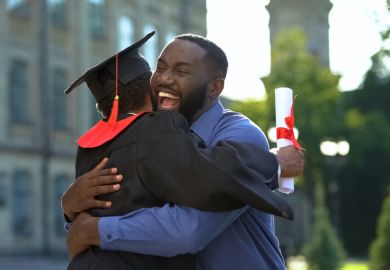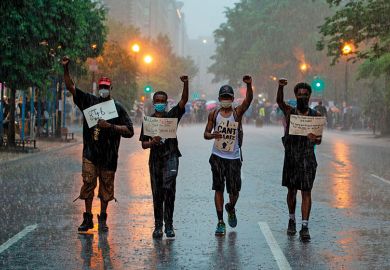Walter Kimbrough is not impressed with America’s most prestigious universities. “If the Ivy Leagues are such great institutions, why don’t they bring in more students from the lower ninth ward of New Orleans? Poor households, poor schools. If you’re so good at teaching, teach that person for four years.”
The outgoing president of Dillard University, a historically black university in New Orleans, tells Times Higher Education why he thinks Ivy League institutions could just “stick [students] in a closet for four years” and achieve the same results, discusses recent bomb threats at historically black colleges and universities (HBCUs), and explains why he is stepping down from a job he loves.
Ivy League
Prestigious universities overwhelmingly cater for students from wealthy backgrounds; “you don’t have to do much because you’re dealing with the best of the best,” according to Kimbrough.
On the other hand, HBCUs, in which Kimbrough is somewhat of an expert – he has worked at several and was recruited to President Biden’s board of advisers on them in March – have to work a lot harder to ensure success for their students, he says.
THE Campus resource: Questions you should ask yourself about your role in institutional racism
HBCUs are made up of about 70 per cent low-income students. “There are a lot of students who are not finishing college, and it’s not because they can’t do the work, it’s because they have to work a job, they have to take care of their family,” Kimbrough says. “Those kinds of things; that’s a bigger factor than people realise.”
Adjusting for socio-economic status, by some measures HBCUs even have better graduation rates than more prestigious universities, he adds.
So how are HBCUs managing to support so many young people to graduate, despite admitting more students with challenges that threaten to derail their education?
Intrusive advising
Kimbrough says that the secret to their success is an approach called “intrusive advising”, and it is, essentially, being heavily involved in the minutiae of students' lives.
Faculty do not just teach, they take an interest in anything in a student’s life that might hinder their education.
“The scariest time for me, even as a president, is if a student says: ‘I need to talk to you,’ and they close the door.” The approach means Kimbrough has experienced everything from mediating disputes between students and their parents that are nothing to do with university, to supporting students through pregnancy, family breakdown and self-harm.
He also takes a personal interest in the highs of their lives and, in fact, he was late for the Zoom call with THE because a student wanted his opinion on which internship he should do over the summer. Some would say a president of a university shouldn’t be having that kind of career conversation with a student; Kimbrough says, “at an HBCU, yes you do”.
This level of support inevitably means time away from teaching and research for faculty, but Kimbrough doesn’t worry about that. “If you think your job is a nine-to-five job, you think your job as a faculty member is just to dispense information, or just teach, then you don’t understand what you’re doing,” he says.
This intrusive advising ethos is central to the 100 or so HBCUs across the US and is integral to their success. But it has an uncomfortable origin story.
Most HBCUs were established after the abolition of slavery, and the thinking behind the approach was, “this is a newly free group of people, they need more structure”, Kimbrough explains. They were run by white people who were heavily influenced by the church and paternalistic. Eventually African Americans took up leadership positions. “I think it evolved over time to be more ‘my job is to make sure you succeed, I’m invested in you’,” he says.
For African Americans, HBCUs can be a much better choice than a mostly white university, Kimbrough believes. He relays his own experience studying at the University of Georgia. He joined in 1985, just two decades after the university became integrated by a court order, “so there weren’t a lot of faculty who looked like me”.
He was an anomaly, he says, because he reached out and made connections, and there was one academic who particularly supported him. “I had to just engage with people who were different, but there are so many people who didn’t do that, they didn’t have that experience. And so they were left to fend for themselves.”
He points to surveys that ask students about their level of satisfaction with the support they receive in higher education, and says they’re overwhelmingly in favour of HBCUs.
Evidence also suggests that black students who attend HBCUs are more successful than black students who attend majority-white universities. So, would Kimbrough advise black students to attend an HBCU? If it matters to them to be around other black students and faculty, then yes.
“I tell people that you should go to the place that’s the best fit for you,” he says. He studied for his master's degree at Miami University in Ohio, a very white area, and it was a great fit for him. “But I see students who will go to a place like that and then they get mad because they’re like, ‘I don’t have black faculty’… But that’s not what they provide.”
The success of HBCUs has not gone unnoticed recently. Journalist and author Malcolm Gladwell last year dedicated an episode of his Revisionist History podcast to trying to work out why Dillard University is so well loved and yet does not rank as high as other prestigious universities in the US News & World Report’s college rankings. (The short answer: money.)
Kimbrough says HBCUs are experiencing a second wave of success, with their graduates now filling the professional classes, as well as some extremely high-profile jobs; US vice president Kamala Harris, who attended Howard University, is just one example.
“If you talk about American history, and you talk about the civil rights movement, if you mentioned somebody, nine times out of 10 they were an HBCU graduate. I think some of that died down for a while and now we’re seeing a resurgence of those graduates once again leading a national conversation,” says Kimbrough.
However, their success may have provoked a backlash. Since the start of the year, almost 60 HBCUs, including Dillard, have received bomb threats, which Kimbrough speculates were a reaction to Harris and other high-profile HBCU graduates. No bombs were actually found but the perpetrators have not been identified either.
Free speech and the Ku Klux Klan
Kimbrough’s tenure at Dillard has not been without controversy. In 2016, he sparked outrage by allowing a former Ku Klux Klan leader to speak on campus, but he is adamant that he did the right thing.
The much-reviled David Duke was taking part in a debate that happened to be filmed on campus property, as opposed to being a university-organised event, but nevertheless his presence sparked angry protests. Kimbrough says that he found the outrage amusing because the university had not invited him.
“That’s a deeper commentary about just the state of play today that people got upset about David Duke speaking in an empty auditorium,” he says. “People were mad at me, but I had to point out, ‘I don’t care because you guys are being stupid’.”
However, he adds that he wouldn’t be afraid to invite Duke to speak himself: “I consider myself to be a radical liberal. I think everybody has a place to have those kinds of conversations.”
Kimbrough comes from a religious background. His father is a United Methodist minister and his mother started off in computer software sales before becoming a professor of religion and philosophy. Kimbrough himself studied to become a vet for two years before switching to biology. (He is still an animal lover, and has two French bulldogs).
Unlike many presidents, he decided that university leadership was his goal while still studying for his undergraduate degree: “I was very involved on campus and said, ‘Oh, maybe I want to be a college president.’” He went to graduate school and studied college student personnel services. “Once I got in that programme, I was like, ‘Oh, this is what I’m supposed to do.’ It was like the light switch went on.”
Since then he has clearly relished taking an active role in supporting students, even after he achieved his ambition of becoming a college president at just 37 years old. His hero is Benjamin Mays, who was president of Morehouse College, an HBCU in Atlanta, Georgia, from 1940 to 1967, and Martin Luther King’s mentor. “I want to be like Dr Mays, because to have that kind of impact on someone who changed the world is, to me, phenomenal.”
And yet, despite this dedication to his students, he is stepping down as president of Dillard at the end of this academic year.
Having been a college president for 18 years, he needs a break, he says. He is drained from the pandemic and from dealing with hurricanes in New Orleans. He will probably take up another leadership role next year or the year after. In the meantime, he plans to write a book on the secret to the success of HBCUs.
Quick facts
Born: Chicago, 1967
Academic qualifications: Bachelor’s degree in biology from the University of Georgia; master’s in college and student personnel services from Miami University; PhD in higher education from Georgia State University
Lives with: His wife and two children
Academic hero: Benjamin Mays, who was the president of Morehouse College from 1940 to 1967 and Martin Luther King’s mentor
This is part of our “Talking leadership” series of 50 interviews over 50 weeks with the people running the world’s top universities about how they solve common strategic issues and implement change. Follow the series here.
POSTSCRIPT:
Print headline: Outgoing Dillard president on why HBCUs out-teach the Ivy League
Register to continue
Why register?
- Registration is free and only takes a moment
- Once registered, you can read 3 articles a month
- Sign up for our newsletter
Subscribe
Or subscribe for unlimited access to:
- Unlimited access to news, views, insights & reviews
- Digital editions
- Digital access to THE’s university and college rankings analysis
Already registered or a current subscriber?








